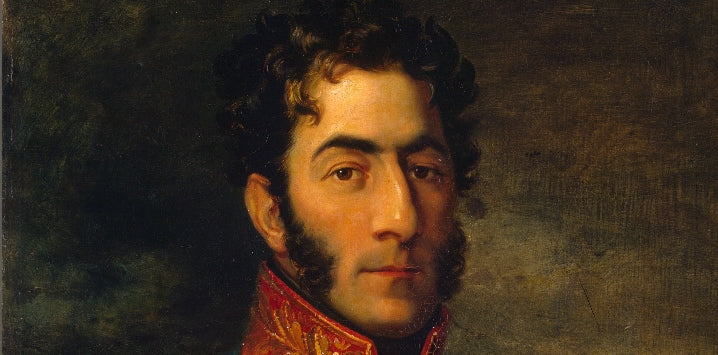The 10th and final part of our series on Ten Greatest Generals of the Napoleonic Wars features Prince Pyotr Bagration, the inspiring Russian commander who fell at Borodino. Of course, there are a whole host of other names that might conceivably have made this list: Murat, Massena, Soult, Suchet, Raevsky, Platov, Schwarzenberg, Gneisenau, Hill, whom we will no doubt come to at a later stage. Those of you who expected something on Napoleon himself - be assured that he is worthy of a lot more than a single blog post!
Prince Pyotr Ivanovich Bagration (1765-1812)
In 1805, Bagration served under Mikhail Kutuzov's command as the allied Russian and Austrian Army attempted to stop Napoleon's march eastwards. After learning of the "unfortunate" Austrian General Mack's capitulation at Ulm, Kutuzov decided to retreat towards a second Russian force under the command of General Buxhoeweden. Kutuzov detached a rearguard of less than 10,000's men under Bagration's command. Despite being outnumbered 5-to-1, Bagration successfully defended his position at Schoengraben for half a day at the cost of half his force, giving Kutuzov precious time to reorganise his men. This exploit won Bagration great acclaim and Russian propagandists would later compare it to King Leonidas's stand at Thermopylae. At the Battle of Austerlitz Bagration commanded the allied right wing, which were the only troops in the allied army to remain in good order at the end of the battle. In 1806 the court poet Gavrila Derzhavin hailed him as bog rati on, or God of the Army.
Bagration continued to serve with distinction in the 1807 campaign, providing fierce resistance at Eylau before conducting a skilled retreat covered by General Barclay de Tolly. The Russian defeat at Friedland on 14 June soon led to the Peace of Tilsit between Russia and France. Following Tilsit, Bagration saw action in the Finnish War in 1808 and the Turkish War in 1809, where he was promoted to the rank of General of Infantry.
During Napoleon's invasion of 1812, Bagration was appointed Commander-in-Chief of the Second Western Army. This 45,000-strong force was initially intended to swing around Napoleon's rear, but the Russian command had significantly underestimated the size of Napoleon's army, leaving Bagration dangerously isolated against Marshal Davout's 70,000-strong I Corps. An aggressive general by inclination, Bagration attempts to encourage Barclay to take the offensive were in vain, and the two generals agreed to unite their forces at Smolensk. Thanks to a combination of luck, skill and determination on the part of the Second Army, Bagration joined up with Barclay at Smolensk. The Russians successfully held on to the city for two days with significant losses for both sides, but Barclay feared encirclement and ordered retreat. A furious Bagration petitioned the Tsar to remove Barclay, hoping to take command himself. In the event, Kutuzov was appointed Supreme Commander.
Kutuzov ordered the Russian Army to continue its retreat until the village of Borodino to the west of Mozhaisk, some 80 miles from Moscow. Bagration's Second Army was deployed on the left flank, which was dangerously exposed to a frontal assault. A redoubt was built at Shevardino, but this was taken by the French on 5 September with both sides sustaining heavy casualties. The following day, Bagration supervised the construction of three arrow-shaped fortifications or fleches to provide his men with some protection.
The Battle of Borodino began early on the morning of 7 September. As expected, Napoleon's main target was the fleches, which changed hands on several occasions during the battle, as Bagration reorganised his men and launched devastating counter charges to expel the attackers from the fortifications. At around 9 o'clock, Bagration was wounded in the leg by an enemy shell. He continued to give orders until he lost consciousness from loss of blood.
Waldemar Lowenstern, Barclay's aide-de-camp, came across Bagration at a dressing point. Having regained consciousness, Bagration beckoned Lowenstern over and asked "How is General Barclay? The fate of the army is in his hands. So far everything is going well." Despite all that had gone before them during the campaign, the sentiment reflected Bagration's respect for Barclay and his recognition that Barclay had successfully preserved the army over the course of the campaign.
Bagration's withdrawal from the battle significantly weakened the morale of the Russian soldiers, who believed he was dead. Even though the rumours were false, the wound would prove fatal. Bagration resisted amputation of his leg and the wound was soon infected. To the regret of the whole Russian army, Bagration died three weeks later, having been evacuated beyond Moscow to the village of Sima in Vladimir Province. In 1839 his body was transferred to the Borodino battlefield and reinterred at the foot of newly built main monument.
Check out our Prince Bagration matryoshka mug!




Share and get 15% off!
Simply share this product on one of the following social networks and you will unlock 15% off!